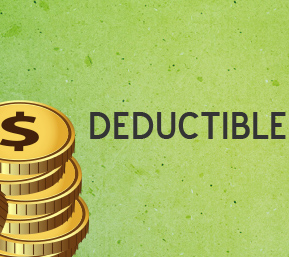 If you have ever bought insurance before, say health, car or home, you have certainly come across the term deductible. But what does deductible mean?
If you have ever bought insurance before, say health, car or home, you have certainly come across the term deductible. But what does deductible mean?
A deductible is the amount of money that the policyholder, which is you, must pay out of their pocket to cover medical expenses before the insurance provider will pay any extra costs. Put more simply, a deductible is the amount “deducted” from an insured loss. The insurance company and the policyholder agree to the share the risk when they enter into a contract. Also, a deductible is always applied on property or health insurance.
The purpose of deductibles is to discourage policyholders from making a huge number of claims of which they can meet the cost comfortably themselves.
The insurance firm restricts coverage to claims that are noteworthy enough to involve large costs. In that event, the insurance premium (the amount you must pay monthly for an insurance policy) is normally cheaper when the amount of deductible is high. The opposite is also true that low deductibles will attract high monthly premiums.
This further explains what does deductible mean. A deductible can either be a fixed amount of money or a percentage of the total amount of insurance in a policy. If you have a health insurance plan that has a fixed deductible of $1000 and you happen to stay in hospital for a while. And the medical expenses amount to $1500. You would have to pay the $1000 first from your pocket before the insurance provider pays the remaining $500.
Percentage deductibles are different. They are calculated as a percentage of the total insurance value. If your property or health is insured for $10000 and the insurance policy has a 3 percent deductible, $300 would be deducted from the amount the insurance provider compensates you. When you suffer insurance loss worth $5000, you would be paid $4700.
Deductibles are contained in the clause of the insurance policy that directs how much expenses covered should be met by the policyholder. The insurance provider then becomes responsible for any expense that goes beyond this amount, but not exceeding the maximum value of the insurance policy as agreed upon by both parties.
Deductibles can either be applied on each incident or on an annual basis depending on the policy. For autoowners or homeowners insurance policy, the deductible is applied every time you file a claim. In the case of health insurance the deductible is applied annually because it is hard to determine the number of medical cases that may occur.
The deductible differs depending on the insurance company and the laws of the state under which they operate. It is advisable that you find information about what does deductible mean when you go shopping for insurance.
Note that deductibles do not apply to the liability section of homeowners or car insurance policy. They apply to the property damage in case of a collision or when the roof of the house is blown off.
